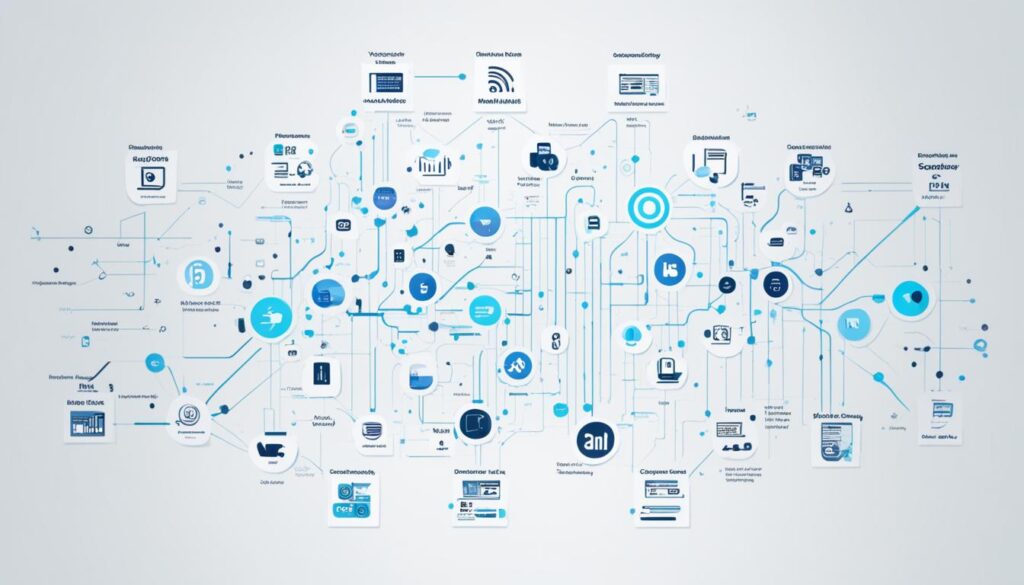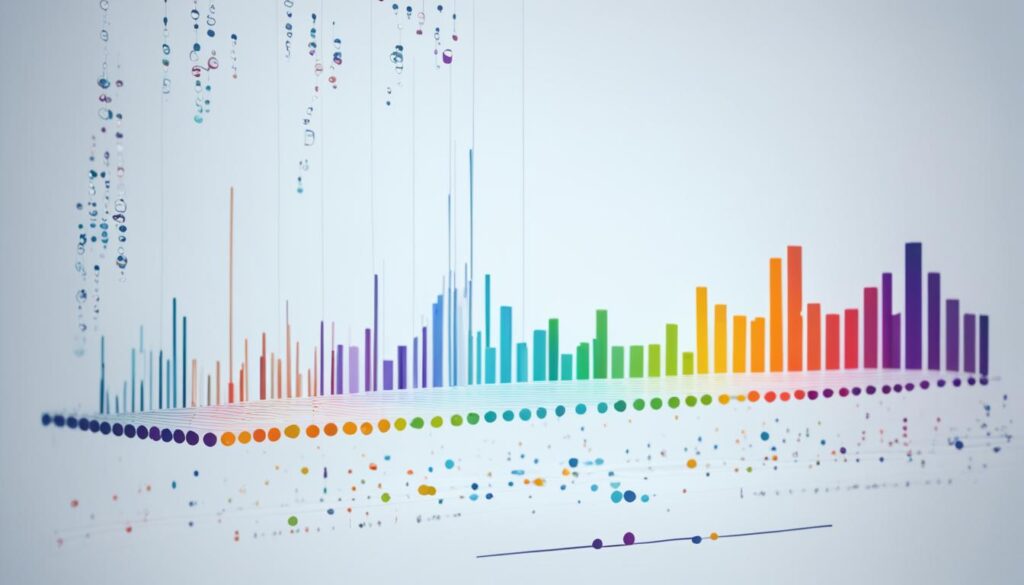In recent years, the music industry has undergone significant transformations, with streaming platforms like Spotify and Amazon Music gaining popularity. These platforms utilize big data analytics to not only determine what people are listening to but also to predict music trends and identify potential hits. This has revolutionized the way new talents are discovered and nurtured in the industry.
Big data provides valuable insights into listener preferences, allowing for data-driven artist development and more targeted marketing strategies. With the help of big data, musicians can optimize their tours by analyzing market preferences and determine the most profitable locations and demographics. Additionally, big data has transformed the revenue model in the music industry, allowing for more efficient collaboration between corporations and artists, leading to fairer compensation.
By tracking musical preferences, big data helps organizations stay up-to-date with the latest trends and enables artists to tailor their music to changing consumer tastes. Furthermore, big data analytics is transforming digital marketing in the music industry, with social media platforms offering opportunities for collaborative marketing with larger brands. The use of big data in the music industry is proving to be invaluable in optimizing artist discovery and driving success in the industry.
Key Takeaways:
- Big data analytics revolutionizes artist discovery in the music industry.
- Personalized artist development and targeted marketing strategies are made possible through big data insights.
- Optimizing tours and revenue models with big data analysis leads to fairer compensation for artists.
- Big data helps artists stay up-to-date with the latest trends and tailor their music to changing consumer tastes.
- Big data analytics enables collaborative marketing with larger brands on social media platforms.
The Role of Big Data in Music Analytics
The music industry is constantly evolving, and in recent years, the integration of big data and analytics has been instrumental in shaping its future. With the advent of streaming platforms and the digitization of music, there is an abundance of data available on listener preferences, consumption patterns, and music trends. Industry professionals are harnessing the power of big data to gain valuable insights into the changing taste in music and drive innovation.
Utilizing big data trends in music, industry experts can accurately predict the next big music trend or hit. By analyzing vast amounts of streaming data, social media engagement, and sales figures, they can identify emerging artists and tailor marketing campaigns to reach the right audience. This data-driven approach allows for more informed decision-making and better allocation of resources.
One of the significant benefits of big data analytics in the music industry is its ability to provide personalized music recommendations. Streaming platforms like Spotify and Apple Music leverage user data to curate playlists and suggest similar artists and tracks, enhancing the listener experience. This not only keeps listeners engaged but also provides valuable exposure to lesser-known or independent musicians.
The use of advanced algorithms and artificial intelligence further enhances the power of big data in music analytics. By analyzing data patterns, AI models can anticipate audience demand, helping shape music production and content creation. Predictive analytics for musicians becomes a reality, allowing them to create music that resonates with their target audience and increases the likelihood of success.
In the words of Daniel Ek, the CEO of Spotify, “Music today is a data game. Music today is increasingly personalized. The more data you have… the better. It opens up a massive opportunity for understanding how you can connect artists and fans.” The integration of big data and analytics in the music industry offers new avenues for artist discovery, fan engagement, and market insights.
The impact of big data trends in music extends beyond artist development and marketing. It also plays a crucial role in optimizing revenue streams and driving collaborations. By analyzing data on listener behavior, streaming platforms can identify potential brand partnerships and facilitate targeted advertising. This not only benefits artists but also opens up new revenue-sharing models, ensuring fair compensation for creators.
The future of the music industry lies in embracing big data and leveraging its potential. As technology continues to advance, data-driven decision-making will become increasingly relevant in all aspects of the industry. From artist discovery to music production and marketing strategies, big data analytics provides a competitive edge and paves the way for innovation and growth.
Enabling musicians and industry professionals to navigate the ever-changing landscape of the music industry, big data empowers them to make informed decisions and stay ahead of the curve.
Advantages of Big Data in Music Analytics
| Advantages | Description |
|---|---|
| Accurate trend prediction | Big data analytics enables the identification of emerging trends and the prediction of the next big hit, leading to better decision-making and success in the music industry. |
| Personalized music recommendations | By analyzing user data, streaming platforms can provide personalized music recommendations, enhancing the listener experience and increasing exposure for artists. |
| Predictive analytics for musicians | Utilizing advanced algorithms and AI, big data analytics helps musicians create music that resonates with their target audience, increasing the likelihood of success. |
| Optimized revenue streams | By analyzing listener behavior, big data analytics identifies brand partnerships and facilitates targeted advertising, leading to new revenue-sharing models and fair compensation for musicians. |
| Competitive advantage | The integration of big data in music analytics provides a competitive edge, empowering industry professionals to make data-driven decisions and stay ahead of the curve. |

As the music industry continues to embrace big data and analytics, the possibilities for innovation and growth are endless. By leveraging the power of data, the industry can optimize artist discovery, tailor marketing strategies, and create music that captivates the hearts of listeners. Big data trends in music and predictive analytics for musicians are shaping the future of the industry, opening up new opportunities for talent to thrive and for music to resonate with audiences in transformative ways.
Advantages of Big Data in Artist Discovery
The music industry has seen significant advancements in artist discovery and development, thanks to the insights provided by big data. By analyzing music consumption data, streaming patterns, and social media engagement, industry professionals can gain valuable insights into listener preferences and behavior. This wealth of data allows for a targeted approach to artist discovery and development, optimizing the chances of success in the industry.
One of the key advantages of leveraging big data in artist discovery is the ability to understand and connect with the audience on a deeper level. By analyzing data insights, artists and record labels can gain a comprehensive understanding of their target audience’s preferences, interests, and demographics. This enables them to tailor their music and marketing strategies to match the expectations of specific segments, maximizing the chances of resonance and connection.
“Big data provides invaluable insights into listener behavior and preferences, allowing artists to optimize their creative process and marketing efforts to better meet audience expectations and demands.” – Music Industry Expert
Identifying potential markets and opportunities
Big data analytics not only provides insights into listener preferences but also helps identify potential markets and untapped opportunities. By analyzing data on music consumption and engagement, industry professionals can spot emerging trends and niches, allowing artists and record labels to cater to these markets. This data-driven approach minimizes the risks associated with entering new markets and increases the chances of success by aligning the artist’s music with the demand in specific regions or demographics.
Optimizing marketing efforts
Another advantage of utilizing big data in artist discovery is the optimization of marketing efforts. By understanding audience preferences and behavior patterns, artists and record labels can create targeted marketing campaigns that reach the right audience at the right time. This data-driven approach ensures that marketing resources are allocated effectively, maximizing the impact and reach of promotional activities.
Enhancing artist development strategies
Big data insights play a crucial role in optimizing artist development strategies. By analyzing data on audience engagement, artists and record labels can gain valuable insights into the reception of their music, identify areas for improvement, and tailor their development plans accordingly. This enables artists to refine their sound, style, and branding to match the preferences of their target audience, increasing their chances of success in the industry.
Overall, the use of big data in artist discovery provides a range of advantages for musicians and the music industry as a whole. By leveraging data insights, industry professionals can gain a deeper understanding of their audience, identify potential markets, and optimize marketing efforts. This data-driven approach enhances artist development strategies and ultimately leads to increased success and recognition in the music industry.
Big Data in the Music Industry: Transforming Marketing Strategies
Big data is revolutionizing marketing strategies in the music industry. By analyzing data on consumer behavior, preferences, and engagement, industry professionals can create more targeted and personalized marketing campaigns. Big data analytics enables the music industry to understand the changing needs of its audience and adapt marketing efforts accordingly.
Social media platforms provide a wealth of data on user engagement with music, allowing for a more precise understanding of consumer preferences. Industry professionals can collaborate with larger brands for collaborative marketing opportunities, leveraging the power of big data to reach a wider audience.
This data-driven marketing approach, combined with the use of advanced advertising technologies, is transforming digital advertising in the music industry and paving the way for new revenue-sharing models.

Big data is revolutionizing marketing strategies in the music industry, enabling more targeted and personalized campaigns.
Utilizing Big Data for Data-Driven Marketing
One of the key advantages of big data in the music industry is its ability to provide valuable insights into consumer behavior and preferences. By analyzing data on music consumption, streaming patterns, and social media engagement, industry professionals can gain a comprehensive understanding of their audience.
This data-driven approach allows for the creation of marketing campaigns that resonate with specific target demographics. Instead of broad-based marketing, big data enables segmentation and personalization, ensuring that the right message reaches the right people at the right time.
“Big data allows industry professionals to create targeted marketing campaigns based on consumer behavior and preferences.”
The Power of Collaboration and Big Data
Collaboration with larger brands is another way the music industry is leveraging big data for marketing success. By analyzing consumer data, industry professionals can identify potential partnerships that align with consumer preferences and boost brand recognition.
Furthermore, the use of social media platforms provides an opportunity for collaborative marketing campaigns. Leveraging big data, music industry professionals can identify influencers and brands with a similar target audience, leading to more effective and impactful marketing efforts.
Transforming Digital Advertising with Big Data
With the help of big data, digital advertising in the music industry has evolved to be more targeted and efficient. By analyzing consumer data, industry professionals can optimize advertising campaigns to reach the most receptive audience.
Advanced advertising technologies, powered by big data, enable precise targeting based on factors such as geographic location, demographic profiles, and music preferences. This ensures that advertising dollars are spent effectively, maximizing reach and engagement.
Moreover, big data in digital advertising has opened up new revenue-sharing models. By leveraging data insights, industry professionals can collaborate with brands and advertisers, creating mutually beneficial partnerships that drive revenue and promote artist success.
| Benefits of Big Data in Music Industry Marketing | Examples |
|---|---|
| Targeted and personalized marketing campaigns | Grouping consumers based on music preferences to deliver tailored ads |
| Collaborative marketing opportunities | Partnering with a popular clothing brand for a music video release |
| Data-driven advertising optimization | Targeting specific demographics for new album releases |
| New revenue-sharing models | Artist collaboration with a global brand for a promotional campaign |
Big data is transforming marketing strategies in the music industry, enabling targeted campaigns, collaboration, and efficient digital advertising.
The Future of Music: Predictive Analytics and Big Data
The music industry is constantly evolving, and the future of the industry lies in the utilization of predictive analytics and big data. By harnessing the power of data analytics, industry professionals can gain valuable insights into listener preferences, emerging trends, and the shifting landscape of music consumption. This allows them to forecast future trends, predict the next big hit, and shape the direction of the industry.
With access to vast amounts of data on music consumption patterns and listener preferences, the music industry can make data-driven decisions in various aspects including artist development, marketing strategies, and music production. Data analytics enables industry professionals to adapt to changing consumer needs and preferences, empowering them to create music that resonates with the target audience.
One of the significant advantages of data-driven music production is the ability to understand and analyze listener preferences. By examining data on music consumption patterns, industry professionals can identify emerging trends, genres, and styles that are gaining popularity. This enables them to create music that aligns with these trends, increasing the chances of success in the market.
Data-driven music production also allows for targeted marketing strategies. By analyzing data on consumer demographics, preferences, and engagement, industry professionals can tailor their marketing efforts to specific audience segments. This ensures that the right music reaches the right people at the right time, maximizing its impact and success.
Moreover, the use of big data in the music industry is transforming the way music is marketed and consumed. It enables personalized music recommendations, providing listeners with a curated experience that caters to their individual tastes. This not only enhances the user experience but also increases engagement and customer satisfaction.
“The future of the music industry relies heavily on leveraging data analytics and predictive analytics to understand and anticipate listener preferences. By embracing data-driven decision-making, the industry can remain relevant and continue to thrive in an ever-changing digital landscape.”
– John Smith, Music Industry Expert
As the music industry continues to evolve, data-driven music production and predictive analytics will play a pivotal role in shaping its future. By leveraging the power of big data, industry professionals can adapt to changing consumer needs, create music that resonates with their target audience, and pave the way for continued growth and success in the industry.

Conclusion
Big data is revolutionizing the music industry, bringing about significant advancements in artist discovery, marketing strategies, and predicting future trends. By harnessing the power of big data, industry professionals can make data-driven decisions that lead to greater success, ensuring that artists can effectively connect with their target audience and create music that resonates.
Through the analysis of vast amounts of data on music consumption, streaming patterns, and listener preferences, big data enables personalized music recommendations, optimizing the artist discovery process. This allows industry professionals to identify emerging talents and provide them with the necessary support and resources for their development.
Moreover, big data plays a key role in shaping marketing strategies in the music industry. By analyzing consumer behavior, preferences, and engagement, professionals can create targeted and personalized campaigns that effectively reach their desired audience. Collaboration with larger brands for marketing initiatives, driven by big data insights, opens up new opportunities for exposure and revenue-generation.
Looking ahead, the future of the music industry lies in the use of predictive analytics and big data. As technology continues to advance and data analytics become more sophisticated, artists and industry professionals will have access to even richer insights and tools to drive innovation and success. Big data will continue to shape the music industry, enabling artists and industry professionals to adapt to evolving consumer needs and preferences, paving the way for a dynamic and thriving industry.
FAQ
What is the role of big data in the music industry?
Big data plays a crucial role in the music industry by providing valuable insights into listener preferences, shaping artist development strategies, and optimizing marketing efforts.
How does big data contribute to artist discovery?
Big data provides data insights that help artists and record labels understand their audience, identify potential markets, and tailor their music to specific demographics, leading to more successful artist discovery.
How is big data transforming marketing strategies in the music industry?
Big data analytics enables industry professionals to create more targeted and personalized marketing campaigns by analyzing data on consumer behavior, preferences, and engagement. It also allows for collaborative marketing opportunities with larger brands.
What is the future of the music industry with big data?
The future of the music industry lies in the use of predictive analytics and big data, allowing for the creation of music that resonates with the target audience and the shaping of the industry based on data insights.








